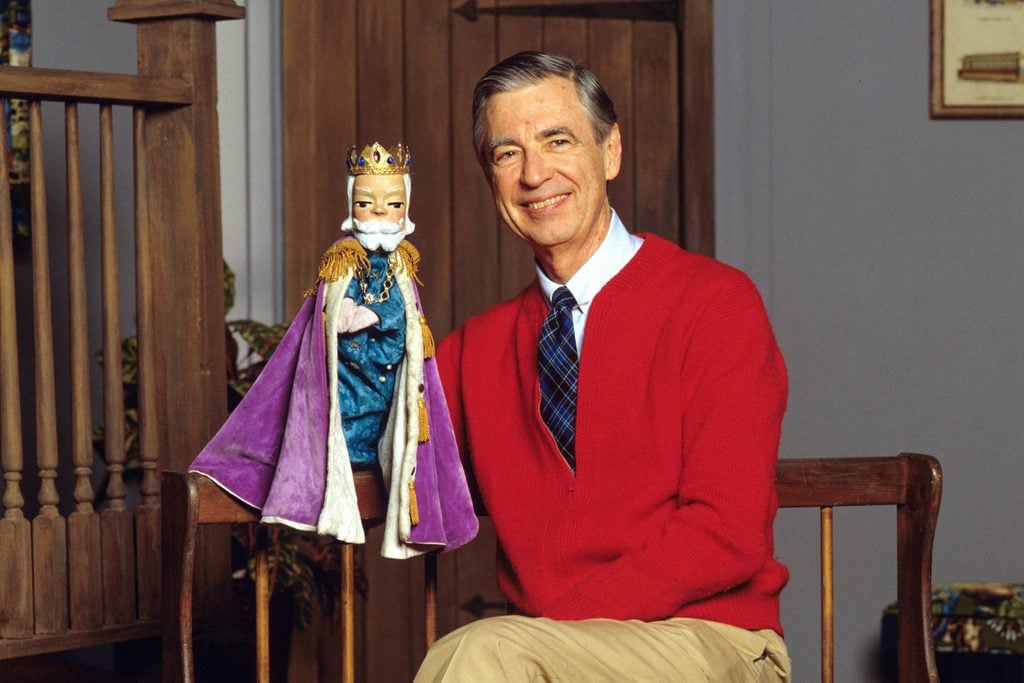The Sad Story Behind Mr. Rogers’ Hallmark Empathy
Updated: Aug. 11, 2021

Fred Rogers' difficult childhood is credited with giving the beloved television host a deeper well of understanding towards others.
Fred Rogers, the beloved host of Mister Rogers’ Neighborhood, is known for red cardigans, his love of children, and above all, for being kind. What’s less known about Mr. Rogers, however—and what seems a fitting story to tell on the 18-year anniversary of his passing—is how his hallmark empathy grew from a difficult and lonely childhood.
A challenging childhood
An only child until a sister was adopted into the family when he was 11, Rogers was overweight, shy, and sheltered. He also suffered from severe asthma, scarlet fever, and “every imaginable childhood disease,” as he put it in a 2002 interview. Such circumstances made it difficult for Rogers to fit in at his elementary school in industrial Latrobe, Pennsylvania, about an hour outside of Pittsburgh.
“I felt I had no friends,” Rogers said in a speech he gave at Saint Vincent College in April 1995. In the same speech, Rogers tells of a time when he was walking home from school and “a whole group of boys” began following him. As he walked the 11 blocks towards his house, the boys began taunting him, then chased after him as he ran away, shouting after him all the while: “Freddy, hey fat Freddy! We’re going to get you, Freddy!”
This is not the only time Rogers was bullied. One of his childhood classmates, Rudy Prohaska, remembers children at school “calling him names” and “bullying Fred,” according to Rogers’ biographer, Maxwell King, in The Good Neighbor: The Life and Work of Fred Rogers. “There were a lot of people in school who irritated me by the way they treated him,” Prohaska said. “I couldn’t take the name-calling and all that.”
Such experiences left Rogers traumatized. “I cried to myself whenever I was alone,” he said in the Saint Vincent College speech.
“It seems that Fred’s greatest adversity was loneliness,” Emily Uhrin, an archivist and researcher at the Fred Rogers Center in Latrobe, Pennsylvania, tells Reader’s Digest. “He was overweight and shy and sometimes felt that people could not look beyond those things.”
The solitude and bullying made for a difficult childhood, but it also gave Rogers a deeper well of understanding towards others. He said in the Saint Vincent College speech that the negative experiences of his childhood made him “(seek) out stories of other people who were poor in spirit, and I felt for them.”
Coming out of his shell
From a young age, Rogers found his champions who saw past his awkwardness. Uhrin recounts a time when Rogers wanted to climb a stone wall at his grandfather’s farm but his mother and grandmother wouldn’t let him because they didn’t want him to get hurt. His grandfather stepped in and encouraged his grandson to climb the wall “because he needed to learn to do things for himself.”
Another person who advocated on Rogers’ behalf was one of his high school classmates, Jim Stumbaugh. “Jim was popular and Fred wasn’t,” Uhrin explains. But Rogers’ social standing improved when Stumbaugh became injured in a football game and Rogers delivered his homework to him at the hospital. Stumbaugh got to know a different side of Rogers through their interactions and when he returned to school from the hospital, he took Rogers under his wing. “Fred credited Jim with giving him the confidence to have a good high school experience,” Uhrin says.
Channeling adversity into strength
As Stumbaugh looked out for Rogers, Rogers looked out for others. “Fred Rogers was intentional in all that he did,” Roberta Schomburg, executive director at the Fred Rogers Center, tells Reader’s Digest. Junod observed something similar in his interactions. “When Fred asked you a question, he wanted to know the answer,” Junod says. “He made kindness a practice, not just something he talked about.”
Journalist Tom Junod, one of Rogers’ friends and the inspiration behind the 2019 movie, A Beautiful Day in the Neighborhood, witnessed Rogers’ hallmark empathy firsthand and tells Reader’s Digest he considers it “one of the great honors and gifts of my life” that he was on the receiving end of Mr. Rogers’ kindness. “To be one of those people that he prayed for, one of those people that he cared for; I’ll never really understand how it happened but I’m really glad that it did,” he says. Junod says he felt Rogers’ love and concern in the form of countless letters, emails, and phone calls.
“Fred had a tuning fork from his own experiences that gave him insight into what other people needed,” Junod continues. “What sets Fred apart is that he wasn’t just a nice guy who helped out people with whatever they needed,” Junod explains, “he was also a true authority figure who, in his own way, was a very powerful human being and he used that power to do good.”
The stories of the good in the world that Rogers accomplished are legend and he’s credited with teaching generations of children to act with empathy, be engaged listeners, and these other good neighbor lessons.
And to think that Rogers’ compassion, his understanding, and everything he came to mean to so many people around the world may never have been if not for a difficult and lonely childhood that shaped a boy into the man he became.
In the 2018 Mr. Rogers’ documentary Won’t You Be My Neighbor?, one of Rogers’ longtime friends and Mister Rogers’ Neighborhood co-stars, David Newell, said it best: “I’ve often wondered if there hadn’t been a “fat Freddy,” would there have been a Mr. Rogers?”
Read on for 50 kindness quotes that will stay with you.
Sources:
- Fresh Air: Children’s TV Host Fred Rogers
- Emily Uhrin, an archivist and researcher at the Fred Rogers Center in Latrobe, Pennsylvania


